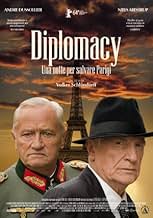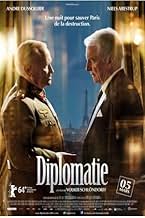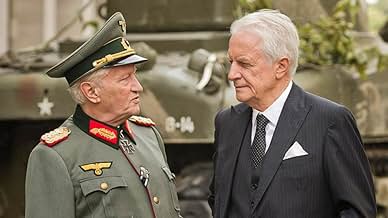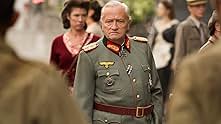Ajouter une intrigue dans votre langueA historical drama that depicts the relationship between Dietrich von Choltitz, the German military governor of occupied Paris, and Swedish consul-general Raoul Nordling.A historical drama that depicts the relationship between Dietrich von Choltitz, the German military governor of occupied Paris, and Swedish consul-general Raoul Nordling.A historical drama that depicts the relationship between Dietrich von Choltitz, the German military governor of occupied Paris, and Swedish consul-general Raoul Nordling.
- Prix
- 5 victoires et 6 nominations au total
- Opérateur radio
- (as Pierre-Marie Rochefort)
Avis en vedette
Several comments: this movie is directed by none other than legendary German film maker Volker Schlöndorff, yes he of "The Tin Drum" from the late 1970s. Who knew he was still around and making movies? Second, while on some occasions there are scenes shot outside, beware that most of the movie takes place in the room at the Hotel Meurice where General von Scholtitz is based, and it truly needs to be emphasized that this is a theatre play brought to the big screen, but still very much a theatre play. Last but certainly not least, the acting performances of the two lead actors (André Dussollier as Raoul Nordling, and Niels Arestrup as General von Choltitz) are nothing short of top-notch and truly carry the film.
"Diplomatie" has garnered rave reviews in Europe, and the screening I saw this at in Antwerp, Belgium last week during a recent family visit, was very well attended. Still, I don't know to what extent this success could be replicated in the US. For me, the movie was a slight bit too static to fully engage me from start to finish. But I would readily suggest that you check this movie out if you get the chance, and draw your own conclusions.
Masterfully set in the tense historical and ideally theatrical moment, the story demonstrated that the combination of the power of the iron will and the eloquent linguistic skills, both built on the trust of the two human beings, was able to defy something impossible.
From the linguistic point of view, the film was made very realistic, switching between German and French. This is a relief, given a flood of supposedly European movies of recent with a way too many English speaking characters.
I want my children to watch this film to eyewitness the history and perhaps something more important than that: Words, not the sword, saved Paris and her people from calamity.
The relationship between the characters of von Choltitz, Governor-General of occupied Paris and Swedish consul Nordling had been touched upon in René Clément's sprawling and star-studded epic 'Is Paris burning?' in which they were played by Gert Frobe and Orson Welles. They met on several occasions but for the dramatic purposes of the play Gély depicts one fictional meeting that takes place in the L'Hotel Meurice on the Rue de Rivoli just hours before von Choltitz is due to carry out Hitler's order to destroy Paris rather than let it to fall into the hands of the advancing Allies.
Here, as opposed to the earlier film, the emphasis is on individual rather than collective action. The means by which Nordling allegedly convinces the hard-nosed and brutal General to rescind Hitler's maniacal order are of course purely hypothetical but results in excellent theatre. Presumably Gély had access to the General's memoirs but how reliable are these one wonders? There are some who have suggested that von Choltitz is merely motivated by the desire to save his own skin, knowing that his previous military actions in Rotterdam and Sevastopol would mark him out as a war criminal(in fact he only served two years in prison) and that anyway, he lacked sufficient time and resources to carry out the order effectively. What is plausible and very much in keeping with the characters is that Nordling promises to get von Choltitz' wife and children out of Germany and into safety in Switzerland if he surrenders the city. It is known than Choltitz had previously refused to obey Himmler's order to ransack the Louvre so already the seeds of defiance were being sewn and like so many officers of the Wehrmacht he had serious doubts about Hitler's sanity. Perhaps after all Nordling wasn't required to do too much persuading.
As for the film Volker Schloendorff has done a marvellous job in sustaining our interest in what is essentially a two-hander. The camerawork of Michel Amathieu is excellent and although shot in colour the contrasts between light and dark aid the drama immeasurably. The director mainly keeps the action within the proscenium arch but a filmically effective scene is where von Choltitz rescinds the order whilst on the roof of the hotel so that both he and the audience have the panorama of Paris in view.
Schloendorff has achieved a perfect balance here between film and filmed theatre and has the advantage in Arestrup and Dusollier of two consummate professionals at the top of their game.
Seventy-five years on it is difficult to appreciate just how close Paris came to destruction. One would dearly love to believe that Nordling's arguments won the day as it gives us a feeling that maybe, just maybe, 'the strength of one in tongue and speech is mightier than all fighting.' We live in hopes!
The acting is great. The run time is super short (75 minutes). The twists are many. The dialogues are sharp. The debates between the two principals are thought provoking and force you to empathize.
Highly recommended. Well made.
Le saviez-vous
- Citations
Général von Choltitz: Do you know what we do to men like you?
Raoul Nordling: Give them a medal?
Général von Choltitz: [breaking a smile] Yes, on occasion.
[stern again]
Général von Choltitz: Posthumously.
- ConnexionsFeatured in Diplomatie: Making of (2015)
- Bandes originalesLa 7ème symphonie
Music by Ludwig van Beethoven (as Beethoven)
Conducted by Wilhelm Furtwängler
Berlin 1943 © Société Wilhelm Furtwängler
Performed by Berliner Philharmoniker (uncredited)
Meilleurs choix
Détails
- Date de sortie
- Pays d’origine
- Site officiel
- Langues
- Aussi connu sous le nom de
- Diplomacy
- Lieux de tournage
- Jardin des Tuileries, Paris 1, Paris, France(city park in front of the hotel)
- sociétés de production
- Consultez plus de crédits d'entreprise sur IMDbPro
Box-office
- Brut – États-Unis et Canada
- 230 880 $ US
- Fin de semaine d'ouverture – États-Unis et Canada
- 8 518 $ US
- 19 oct. 2014
- Brut – à l'échelle mondiale
- 4 207 242 $ US
- Durée
- 1h 24m(84 min)
- Couleur
- Mixage
- Rapport de forme
- 2.35 : 1




























